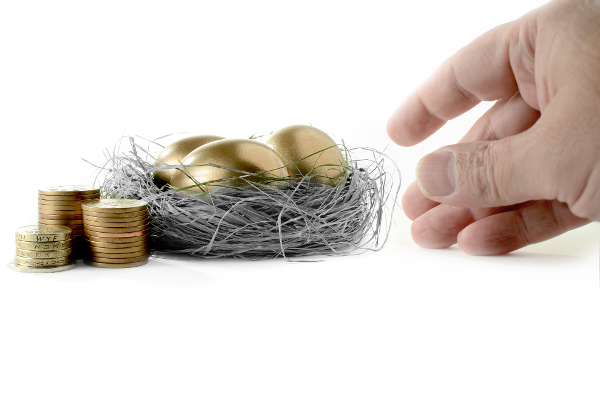Dipping into your pension during the crisis? Beware an extra-large tax bill
For those who take a one-off sum from a pension pot for the first time, the excess tax can run into thou…
20th May 2020 10:48
by Hannah Smith from interactive investor
For those who take a one-off sum from a pension pot for the first time, the excess tax can run into thousands of pounds.

Over-55s who take money out of their pension pots during the coronavirus crisis may have to claw back larger than usual tax overpayments from HMRC, pensions consultancy LCP has warned.
LCP director and former pensions minister Steve Webb explains that when people access their pensions flexibly, HMRC forces pension providers to deduct more tax than is actually due. LCP’s research predicts that this over-taxation is “set to get more draconian” during the current crisis, as people’s income from other sources is reduced but they are still taxed up front in the same way.
- Steve Webb’s Pension Clinic
Since the government brought in pension freedoms in 2015, those over 55 have been able to take money from their pension pots rather than buying an annuity. HMRC figures show 348,000 people did so in the first quarter of this year, making an average withdrawal of £7,100. Total withdrawals came to £2.5 billion, an increase of almost a fifth from the previous year.
- Pension freedoms figures: notable rise in withdrawals, but five-year data shows more measured approach being taken
Many of these withdrawals will be by people taking relatively modest amounts on a regular basis where over-taxation is unlikely to be an issue, says LPC. But for those who take a one-off sum from a pension pot for the first time, the excess tax can run into thousands of pounds.
This is because HMRC requires the use of an emergency tax code, in effect taxing people up front as if they were going to make repeated withdrawals, not just one. Savers must then reclaim the tax they have overpaid. Those who don’t claim at the time are refunded after the end of the financial year.
HMRC has repaid more than £600 million in over-paid tax on pension withdrawals since 2015. In the first quarter of this year, 10,000 people received an average refund of £3,000 each.
- £600 million reclaimed from pension freedom tax trap
LPC gives the example of someone cashing out a £40,000 pension pot. The rules allow 25% (in this case £10,000) to be taken tax-free, with the remaining £30,000 taxable. A basic-rate taxpayer should pay £6,000 in tax, leaving them with £34,000, but in fact the pension scheme would have to deduct almost double that figure, to leave them with just £28,000 until the saver could reclaim the excess.
How much tax people pay on pension withdrawals depends on how much other taxable income they have over the tax year. The table below shows the correct tax bill and refund due on three different assumptions about someone’s other taxable income in the year.
| Other taxable income during 2020/21 | Actual tax deducted on pension withdrawal (£40k pot of which £30k taxable) | Correct tax on pension withdrawal | Refund due |
|---|---|---|---|
| £12,500 | £11,781 | £6,000 | £5,781 |
| £25,000 | £11,781 | £7,000 | £4,781 |
| £50,000 | £11,781 | £12,000 | [-£219] |
“It is already unacceptable that HMRC routinely over-taxes thousands of people on one-off withdrawals from their pension pots, leaving them to fill in forms to claw back the excess tax that they have paid,” says Webb.
“But, in the current crisis, this system will be even more penal. Lots of people who lose their jobs or suffer wage cuts will have reduced taxable income in 2020-21. As a result, they should be paying less tax on these withdrawals. But HMRC is going to carry on taking exactly the same amount of tax up front as it has always done. This means that hard-pressed individuals will be over-taxed by more and will have to claim back more money - tax that they didn’t owe in the first place,” he adds.
“This system has to change. The system of ‘emergency tax’ on one-off withdrawals from pension pots has already been widely criticised and it now looks unfit for purpose in the current crisis. HMRC should think again as a matter of urgency.”
- Taxpayers given an extra three months to appeal against tax decisions
This article was originally published in our sister magazine Money Observer, which ceased publication in August 2020.
These articles are provided for information purposes only. Occasionally, an opinion about whether to buy or sell a specific investment may be provided by third parties. The content is not intended to be a personal recommendation to buy or sell any financial instrument or product, or to adopt any investment strategy as it is not provided based on an assessment of your investing knowledge and experience, your financial situation or your investment objectives. The value of your investments, and the income derived from them, may go down as well as up. You may not get back all the money that you invest. The investments referred to in this article may not be suitable for all investors, and if in doubt, an investor should seek advice from a qualified investment adviser.
Full performance can be found on the company or index summary page on the interactive investor website. Simply click on the company's or index name highlighted in the article.